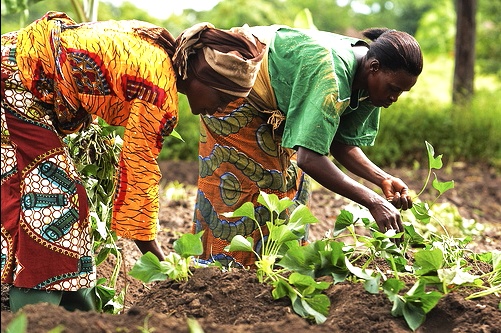This column joins Nigerians and indeed the whole world to celebrate the latest sensation among our women folk, DAME Dr. Adaora Umeoji, the incoming Group Managing Director and Chief Executive Officer of Zenith Bank. This highly cerebral lady has hit the limelight at a very auspicious time when Nigerians are looking for leaders who could offer the solution to the current paralysis hanging over the nation. Every sector or industry of the Nigerian economy needs turnaround managers to pull us back from the brink. Who knows, this may be the reason she’s being unveiled now.
Adaora (which literarily means “Everybody’s daughter) has joined the rising list of Nigerian Amazons taking over the driving seats in the nation’s banking sector.
This is a sector that is so critical to the effort to rebuild the battered foundations of our economy. And for women to be taking over the wheels at this time is quite significant. They have shown that in many ways they are good (and sometimes, better) managers of resources.
With her arrival, there are at least now 11 such bank groups where females are in charge, as the CEO and managing director. Other banks with female leaders are GTBank – Olusanya Miriam; Fidelity Bank – Nneka Onyeali-Ikpe; FCMB – Yemisi Edun; Unity Bank – Tomi Somefun; FSDH – Bukola Smith; Union Bank Yetunde Oni; Suntrust – Halima Buba; Citibank – Ireti Samuel-Ogbu, and Lotus (Islamic Bank) – Kafilat Araoye.
FG calls for Ramadan Reflection, advocates unity community empowerment
FG to replicate sensitisation on clean cooking in 6 geo-political zones
That title confers on the holder the responsibility to paddle the canoe of the enterprise and drive it to success. And the men had better sit up; these women are determined to go all the way with their zeal to excel.
Nigerian women have indeed come a long way in stamping their authority on the public sphere, from academics to public service; governance, industry, diplomacy, and every conceivable area of human endeavour. They have led wars and protests against unjust governments. Here we remember the name, Funmilayo Ransome-Kuti, and those behind the Aba Women’s Riot of 1929.
I got a glimpse of the towering position of Nigerian women on the world stage 27 years ago when I attended the Global Knowledge Conference held in Toronto, Canada in June 1997. I attended the event from Accra, Ghana, where I lived and worked as a freelance journalist. At the event, I had the privilege of seeing a Nigerian woman who is still blazing the trail today. Global Knowledge Conference was hosted by the World Bank, and the Canadian government, together with many co-sponsors, including the Baby Bells of the United States.
I mention the Baby Bells because the event centred on the emergence of a new phase of their industry, telecommunications. The Bells are the telecoms companies spun off from the giant, AT&T, in 1984, following its unbundling by the Federal Communications Commission acting on America’s anti-trust laws.
The gathering had as its theme “Global Knowledge 97: Knowledge for Development in the Information Age,” and was held from June 22-25. It drew participants from across the world and was called for the nations to parley on the emerging Super Highway, as the Internet was called then. So, the world and its leaders converged in Toronto. James Wolfson, the President of the World Bank then, was there. So was Kofi Annan, Secretary General of the UN at the time.
On the first night of the event, during cocktail speeches by the leaders of the organisers, a Nigerian who had travelled to the event from Kenya where he was working with the Canadian International Development Agency, said to me, “Look at that woman there, she is the highest-ranking Nigerian at the World Bank”.
That woman is our own Dr. Ngozi Okonjo-Iweala. I was hearing about and seeing her for the first time. At that time, in 1997, she was a Vice President of the World Bank. That description of her by our fellow compatriot as “the highest-ranking” Nigerian at the World Bank has stuck with me till today. The great woman has gone on to other positions: a Managing Director at the World Bank, a Minister of Finance and Coordinating Minister of the Economy for the Federal Republic of Nigeria, and today, the Director-General of the World Trade Organisation.
Writing a report on the proceedings at the event, J. Krueger, K. Schmidt, and G. Terrill said: Participants focused on using the information revolution for economic development social cohesion, and poverty alleviation in the 21st century. The goal was to explore the role of knowledge and information in sustainable development and how the information revolution changes the development process.
The conference successfully fostered dialogue and partnerships to address the challenges and opportunities posed by the information revolution.”
They noted that besides the World Bank and the Canadian government, it was sponsored by 47 other public and private organizations and attended by more than 2000 participants from 124 countries.
It was such a high-level gathering of technocrats and leaders to shape the then-emerging communication architecture that later morphed into the internet and the global communication network. Yet, at such a gathering, a Nigerian woman was there, giving part of the opening speeches. I felt proud to be a Nigerian. That was 1997, some 27 years ago.
I have used her story to motivate my children and others, especially the girls. Sometimes I ask a young girl, “Do you know Ngozi Okonjo-Iweala?” Some answer in the affirmative. Okonjo-Iweala has become a poster face of a female achiever, and many mothers are keying into that. Her unique African print attire has been adopted by both old and young African ladies.
That list has grown to include Adaora and the other female leaders in the banking industry, who we are celebrating today. There are countless others in all fields, doing amazing things, some having to surmount unimaginable challenges. Let all young women everyone take them as role models. For Adaora to achieve three first degrees, three master’s degrees, a PhD, also raise six children, and now rise to the pinnacle of her career, there is something everyone can learn from her.

 Join Daily Trust WhatsApp Community For Quick Access To News and Happenings Around You.
Join Daily Trust WhatsApp Community For Quick Access To News and Happenings Around You.


